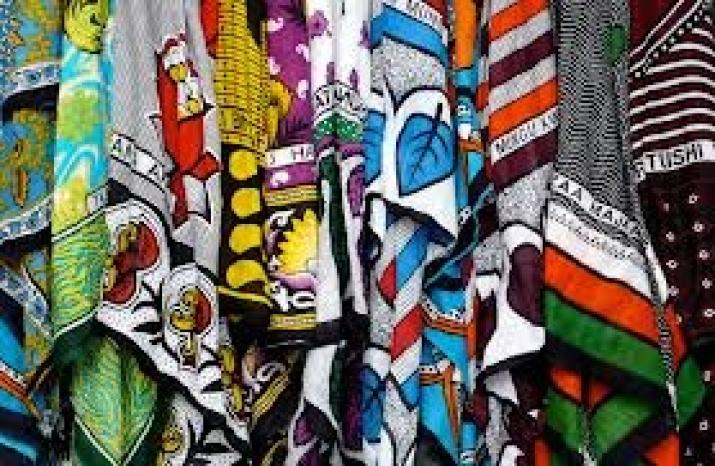
Kangas for Sale - A selection of typical kangas and kitenges, similar to those we see everyday at the local dukas. (Image courtesy of Google)
Published June 29, 2013, last updated on October 5, 2017 under Voices of DGHI
By: Chandra Swanson
This weekend marks the halfway point of our time in Uuwo. It’s a crazy thought, since this first half has flown by. We’ve been gathering words of wisdom and tallying up lessons learned not only about global health and medicine, but also about day-to-day life in Tanzania. In this time of reflection, I thought I’d share our top realizations. Like the sayings decorating our kanga hems, these maxims have stood the test of time (well, at least these four weeks).
- Winter in Tanzania does actually mean winter.
In many ways, Mwika Uuwo is quintessential “East Africa”, but in many more ways Uuwo is not the stereotypical “Africa” of the Serengeti. Seeing my breath on the particularly cold mornings, I’m forming a richer image of Africa, and especially our Kilimanjaro region. And just as winter in the States often means flu season, the dispensary tells us they also see more colds come June.
Thus, Kanga Line Number 2:
- Just because you have a cough doesn’t mean you have malaria.
Tanzania has revealed my hidden germ-a-phobia. Perhaps it was the constant exposure to the vast and varied illnesses people can contract here plus an over-active imagination, but every bug bite and every scratch has received constant surveillance, with second and third opinions. Then came a moment when I stopped, counted up all my fellow sufferers, and finally put my germ-a-phobia to sleep. (We have yet to relinquish our hand sanitizer – it’s flu season until August.)
While winter may be winter, …
- The “dry” in “dry season” is a relative measure.
- A great way to predict the weather – If Brittany does laundry, it will rain the next day.
Four weeks in Uuwo and Mount Kilimanjaro has yet to appear in the sky. After a lovely first week, we’ve had only hours of sunlight, and cabin fever hit us hard. Happily, we had plenty of sources of entertainment. The numerous soap operas imported from Asia are one such source:
- Mara Clara time is sacred time.
Mara Clara, a Filipino drama, is the universal family favorite. After lunch, we all gather around the TV to poke fun of the endless crises and get entirely caught up in the wild storyline. But the electricity is not endless. (In fact, as I have been finishing this post, the power in Moshi has cut out once already). But no matter, because our Mara Clara time is a small example of a larger truth: family time is sacred time. It may not reflect every Tanzanian family, but for the 8 foreigners at Mama Nancy, our piecemeal family is our center.
Recently, we welcomed our newest addition (courtesy of one of our German housemates), a rooster named James, and we learned:
- Don’t buy a rooster at a church auction.
Going “pole pole” and being wildly spontaneous are not mutually exclusive – while some things happen slowly, many of our adventures have happened at the drop of a hat. Buying animals though… When someone donates their rooster to the church, there’s a reason. In James’s case, our newest family, it’s over-enthusiasm. Still, participating in church auctions has been one of our goals this summer. Not only is it rapid-fire way to practice numbers, but church is central to community life. Church was our first introduction to Uuwo, and has been a great place for meeting new people and immersing in community activities.
For all our immersion, we’ve still clung to some American tastes:
- There’s no such thing as too much Nutella.
- When do you go to Moshi? When the Nutella supply runs out.
There is much to be said for experiencing life as a local, but while my taste buds have fallen in love with chapatti, the sight of Nutella on the breakfast table brightens everyone’s day – mzungu and local. Luckily, in our attempts to fully engage in Uuwo, there is no better advice than:
- A little Swahili goes a long way
For one thing, if you’re not careful in your translations, then you might end up buying a funeral kanga. Some of the most important words to learn are names. We were quickly christened “mzungu”, but many people also picked up our names within the first few weeks. We had a bit more difficulty in passing the daily quizzes from the dispensary staff and from the children we met on the road. On a practical level, our participants often got a kick out of our broken Swahili, and it helped to ease into the interviews. To be able to communicate is also immensely gratifying. There’s such a moment of reciprocal joy when you can greet an old grandmother in the right rhythms and with their due respect – I’ve hardly ever experienced such great benefits for so little effort.


